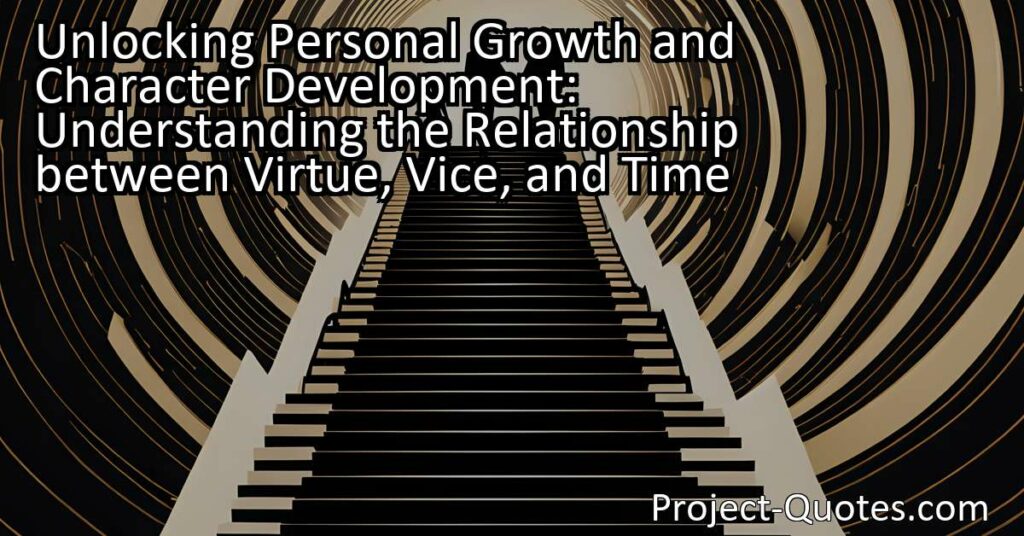He that is good, will infallibly become better, and he that is bad, will as certainly become worse; for vice, virtue and time are three things that never stand still.
Charles Caleb Colton
Discovering Personal Growth and Character Development: Exploring Virtue, Vice, and Time In the search for personal growth and character development, we must understand the relationship between virtue, vice, and time. Virtue, defined as moral goodness, leads to continual improvement, while vice, immoral behavior, worsens over time. By consciously cultivating virtues and avoiding vices, we can embark on a journey of self-improvement and become the best version of ourselves.
Table of Contents
- 1 He that is good, will infallibly become better, and he that is bad, will as certainly become worse; for vice, virtue and time are three things that never stand still.
- 2 Charles Caleb Colton
- 3 Meaning of Quote – He that is good, will infallibly become better, and he that is bad, will as certainly become worse; for vice, virtue and time are three things that never stand still.
- 4 Freely Shareable Quote Image
- 5 Related
Meaning of Quote – He that is good, will infallibly become better, and he that is bad, will as certainly become worse; for vice, virtue and time are three things that never stand still.
Have you ever heard the saying, “Practice makes perfect”? Well, it seems that this quote perfectly captures the essence of personal growth and character development. As the quote states, “He that is good, will infallibly become better, and he that is bad, will as certainly become worse.” In simpler terms, if you are a virtuous person, you will inherently continue to improve, while those who lean towards vice will only worsen in time. But what exactly does this mean? Let’s take a closer look and explore the relationship between virtue, vice, and the passage of time.
Firstly, let’s address the concept of virtue. Virtue can be defined as the quality of being morally good or righteous. It encompasses a wide range of positive qualities such as honesty, kindness, compassion, and integrity. When a person possesses virtue, they radiate positivity and make a conscious effort to do what is right.
Now, imagine a person who consistently makes morally sound decisions and displays virtuous behavior. This individual is on a path of self-improvement. They are constantly striving to become a better version of themselves. With each positive action they take, their virtue expands and strengthens. It becomes an intrinsic part of who they are, guiding their choices and shaping their character.
However, it’s important to remember that personal growth is not a destination but a lifelong journey. The quote acknowledges this by stating that “virtue and time are two things that never stand still.” Just like time keeps moving forward, so does the development of virtue. It is an ongoing process that requires dedication and continuous self-reflection.
As time passes, a person’s commitment to virtue can be tested. Life presents various challenges and temptations that may entice someone to deviate from their virtuous path. Nevertheless, a truly virtuous individual will use these moments as opportunities for growth. They will learn from their mistakes and make conscious efforts to improve, rather than succumbing to vice.
But what is vice? Vice refers to immoral or wicked behavior, the opposite of virtue. It encompasses undesirable qualities such as dishonesty, greed, cruelty, and selfishness. Just like virtue, vice can also grow and intensify over time. If a person consistently makes poor choices and adopts negative behaviors, their vice will gradually become more deeply ingrained within them.
Here’s where the quote becomes particularly poignant: “He that is bad, will as certainly become worse.” When someone embraces a path of vice, their negative actions become more frequent, and their moral compass becomes skewed. They may become less empathetic towards others, prioritize their own desires above all else, and ultimately become detached from the values that nurture a virtuous character.
The progression towards vice is not only detrimental to the individual but also affects the relationships they form and the world around them. Negative behavior tends to breed more negativity, creating a vicious cycle that perpetuates harm and discord. Without awareness and conscious effort, those on this path may find themselves entangled in a web of negativity that is difficult to escape.
It is worth noting that while some individuals may lean towards virtuous behavior naturally, others may struggle with their vices. Everyone makes mistakes and faces moral dilemmas from time to time. However, the true measure of a person lies in their willingness to acknowledge their flaws and actively work towards improvement.
So, how can one cultivate virtue and avoid the slippery slope of vice? The first step is self-awareness. Taking the time to reflect on our actions, values, and motivations can provide valuable insights into our character. It allows us to identify areas where we can grow and make positive changes.
Setting goals is another crucial aspect of personal growth. By setting goals aligned with virtuous qualities, such as being more honest or compassionate, we give ourselves something to strive for. This creates a sense of purpose and provides a roadmap for our journey towards a virtuous life.
Additionally, surrounding ourselves with individuals who embody the qualities we admire can serve as a source of inspiration and support. Observing and learning from virtuous role models can help us develop our own character and reinforce our commitment to virtue.
Lastly, it’s important to remember that personal growth takes time and patience. It is an ongoing process filled with challenges and setbacks. However, with perseverance and a genuine desire to improve, anyone has the potential to cultivate virtue and become a better version of themselves.
In conclusion, the quote “He that is good, will infallibly become better, and he that is bad, will as certainly become worse; for vice, virtue, and time are three things that never stand still” encapsulates the essence of personal growth and character development. It reminds us that virtues and vices are not stagnant; they are influenced by the passage of time and our own choices. By consciously striving to cultivate virtues and avoid vices, we can embark on a lifelong journey of self-improvement. So, let us embrace the power of virtue and make choices that will allow us to become the best version of ourselves.
I hope this quote inspired image brings you hope and peace. Share it with someone who needs it today!


